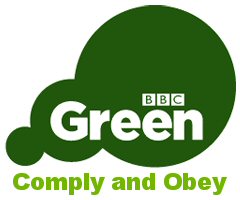Greenwashing In The BBC [Guest Article]
Posted by keith on August 13th, 2010
Greenwashing has a habit of making it into every facet of our society, not just from the obvious sources such as the PR offices of polluting corporations, but also for example from major charities and in the media. A recent example I came across is a blog post from last October by the BBC’s ‘Ethical Man’ Jason Rowlatt, entitled “Is the green movement too radical?”.
In his article the main thrust of his argument is that the ‘green movement’ should accept carbon markets as the solution to limiting emissions, rather than more systematic changes involving the basis of the economy. Accepting the need to cut emissions, he asks:
So how can we find ways to persuade people to change their behaviour? Most economists believe the most powerful instrument for changing behaviour is the market…Economists say we need some system of “carbon pricing”.
Note how he talks about economists – no criticism or balance (that the BBC is meant to be so famous for) about what they say, just a simple statement of what they think as fact. ‘Greens’ on the other hand are presented as sceptics and destructive (note the reference to smashing capitalism, and repeated reference to the ‘Greens’), and their barely presented argument dismissed:
It is not a policy that is likely to engage most mainstream politicians – or for that matter – ordinary people. What is more, spurning market solutions means ignoring one of the most powerful mechanisms for changing behaviour ever developed.
Although he is right that systemic changes are less popular to our politicians and to people wanting to continue with their modern lifestyles, the latter statement is backed up by no evidence or argument, it is simply presented as fact. It is telling that he uses the claim that “With just six years left, surely we should use all the weapons in our armoury to get change” in order to justify only using the carbon market. Perhaps this reflects his blog’s focus on “what individuals can do to tackle climate change” – focusing on our own individual actions rather than those of the institutions who cause most of the damage.
Neither does Jason mention that Europe’s own carbon trading system (ETS) not only failed to reduce emissions, as too many permits were issued to corporations by our leaders for free, fluctuating prices meant the polluters actually made more money than they would have done otherwise – in effect, carbon trading paid them to pollute more. As a result of these inherent shortcomings, carbon trading is even more unrealistic as a method of limiting emissions than the more “radical” solutions, such as systemic changes to the way society and the economy operates, that the Ethical Man dismisses. More information on carbon trading can be found at http://www.carbontradewatch.org/, and in the ‘zine “The Carbon Supermarket”.
What is most revealing about this case though is that an article clearly biased towards the politically favoured solution of carbon trading is being published by a supposedly neutral media organisation. Although this is his personal blog, it is still hosted by the BBC, and it would be surprising if the BBC allowed “radical” greens to operate in the same way. It wouldn’t therefore be surprising that this sort of bias didn’t slip into their more mainstream productions too, especially as Jason is the BBC’s in-house reporter on climate change and looking at his record of posts (for example including “Is the green movement bad for the environment?” and “Greens on trial” which both make much the same points again). Indeed, Media Lens reports on the extent to which this occurs in the mainstream media.
A key player in the ensuing demolition of the Green movement – which is what happened – is the mass media, the means by which environmental concerns might have reached and mobilised a mass audience. The media is part of the same corporate system, one that naturally protects traditional centres of power and short-term profits against rational challenges of exactly the kind Greens had in mind. Thus, despite all the evidence, Greens and progressives have continued to be ignored, marginalised and vilified.
This is yet another example showing that major media organisations such as the BBC are as implicit in greenwashing and preserving the status quo as the corporations environmentalists normally target. Greenwash has seeped throughout the establishment and contaminated it – we must see through the organisations we were brought up to trust if we are to move beyond the status quo that they form a part of.
This article was written for The Unsuitablog by the environmental activist and writer, David McKay.






August 16th, 2010 at 8:18 am
It’s hard to understand why people bother with the BBC. It’s so dumbed down it becomes useless as a source of information, not to mention it’s impartiality is a complete joke.
August 27th, 2010 at 6:42 pm
It doesn’t help that the BBC, supposedly so impartial is funded by the Government, and so will naturally implicitly support Government policies- to speak out too much against the body which funds you generally shortens any organisation’s lifespan. Only an independent mass media outlet can be of any help to “radical” movements.